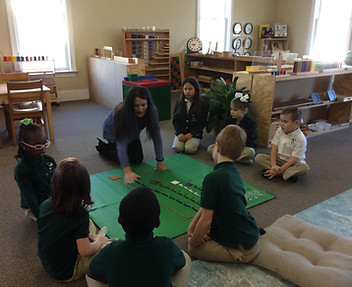Elementary: Learning How to Think
1st - 3rd Grades
The Princeton Preparatory Schools Elementary program offers your child an unparalleled opportunity for growth in this new period of life. Your imaginative, social and creative child needs an environment with appropriate freedom and limitations, with an expansive curriculum to support her curiosity and prepare her for the challenges of the future.
DEVELOPING
FLEXIBILITY, RESILIENCE AND GRIT
We believe children learn to be adaptable by supporting them to solve their own problems, rather than solving problems for them. With the help of a supportive adult, your child can, most often, find the solution that is best for him or her.


Learning without Limits
Your child will study both broadly and deeply, covering many subjects not attempted in conventional schools. Because there is not a rigid schedule or prescribed curriculum that the whole class must follow, your child can focus intensely on her self-chosen work, with minimal interruption.
At the same time, your child will collaborate with the teacher to ensure that work is challenging and purposeful – and that basic standards are met. In that way, the teacher is in charge of the minimum scope of work – your child is in charge of the maximum. This is what we call freeing the child's potential and learning without limits.

The Teacher; The Guide
To quote Bruce Lee: “A teacher is never a giver of ‘truth’; He is a guide, a pointer to the truth that the student must discover for himself.” We couldn’t agree more.
Our credentialed Montessori teachers don’t have a specific area of expertise and we don’t have “specialist” teachers for subjects like art, P.E, or music. Instead, our teachers have a broad knowledge of all subjects areas to help students discover interests in any area imaginable and to challenge them to deepen the field of study through research. Instead of giving the right answers, the teacher inspires students to research the answers themselves.

Developmental Needs
Your elementary age child has a strong drive for social connection. He or she is starting to develop deeper friendships and a connection to the community around. Why then, would we want children to learn in rows of desks, confined to a chair, while the teacher lectures the class as a group? Instead, we embrace your child’s natural need for social exploration by giving lessons in small groups and encouraging children to work with a variety of others on follow up projects and research into subjects of intense interest. In a Montessori elementary program, children help children before adults help children, resulting in teamwork, independence and a true learning community.

Beyond the Classroom
We want the children to be comfortable navigating the world, not just our classroom. As a result, the children must ‘go out’ beyond the limits of the classroom to find the information or resource that they need. A Going Out is a planned undertaking by a small group of children. They find a resource in the community, schedule the outing, arrange for their own transportation and supervision (by staff or parent volunteers), prepare themselves for the experience and conduct themselves with dignity while out in public. Each Going Out is an entire course of study on independence, responsibility and good citizenship — to say nothing of the intellectual rewards that children get from such experience.

Learning as its Own Reward
We have high expectations for your child, and we believe that rewards and punishments appeal to the lowest levels of childrens intellect. Given stickers, children will do their best for a few minutes. Given experiences that help them to believe in themselves and in their abilities, they will do their very best for a lifetime.
Think about how you do your best work. Is it when you are interrupted by others or when you work to an external time table? Probably not. Our class day consists of long, open ended work periods that respect your child’s curiosity and concentration.

Contextual Learning
Unlike in a conventional program with a separate time of the day for each subject, your child will gain a much deeper understanding of concepts by learning in context.
The starting point for all courses of study is the “Great Lessons”; these impressionistic and scientific stories give your child the “big picture” of astronomy, earth science, geography, physics, biology, history, anthropology, cultural and social studies, language, math, music and art. Meaningful learning happens when children understand the “why” as much as the “what” – and are inspired to learn even more on their own.

